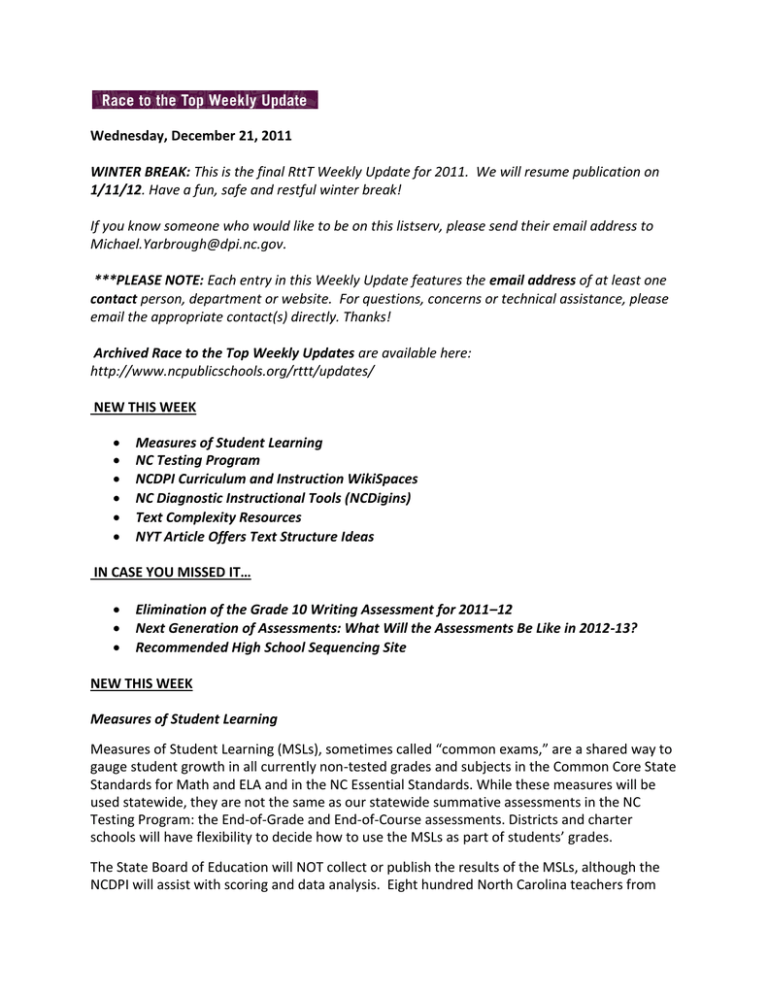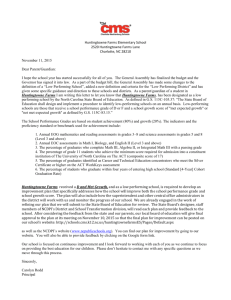Wednesday, December 21, 2011 WINTER BREAK: 1/11/12
advertisement

Wednesday, December 21, 2011 WINTER BREAK: This is the final RttT Weekly Update for 2011. We will resume publication on 1/11/12. Have a fun, safe and restful winter break! If you know someone who would like to be on this listserv, please send their email address to Michael.Yarbrough@dpi.nc.gov. ***PLEASE NOTE: Each entry in this Weekly Update features the email address of at least one contact person, department or website. For questions, concerns or technical assistance, please email the appropriate contact(s) directly. Thanks! Archived Race to the Top Weekly Updates are available here: http://www.ncpublicschools.org/rttt/updates/ NEW THIS WEEK Measures of Student Learning NC Testing Program NCDPI Curriculum and Instruction WikiSpaces NC Diagnostic Instructional Tools (NCDigins) Text Complexity Resources NYT Article Offers Text Structure Ideas IN CASE YOU MISSED IT… Elimination of the Grade 10 Writing Assessment for 2011–12 Next Generation of Assessments: What Will the Assessments Be Like in 2012-13? Recommended High School Sequencing Site NEW THIS WEEK Measures of Student Learning Measures of Student Learning (MSLs), sometimes called “common exams,” are a shared way to gauge student growth in all currently non-tested grades and subjects in the Common Core State Standards for Math and ELA and in the NC Essential Standards. While these measures will be used statewide, they are not the same as our statewide summative assessments in the NC Testing Program: the End-of-Grade and End-of-Course assessments. Districts and charter schools will have flexibility to decide how to use the MSLs as part of students’ grades. The State Board of Education will NOT collect or publish the results of the MSLs, although the NCDPI will assist with scoring and data analysis. Eight hundred North Carolina teachers from more than 100 LEAs and 10 charter schools are involved in the design process for the Measures of Student Learning. The design group members began their work in October and will continue to provide feedback for the remainder of 2011-12 school year. NC will implement the MSLs statewide during the 2012-13 school year. MORE INFO: Jennifer Preston, Jennifer.Preston@dpi.nc.gov NC Testing Program The NC Testing Program will continue delivering statewide summative assessments in grades 38 in Mathematics and English Language Arts, grades 5 and 8 in Science, and at the high school level for Algebra I, English II, and Biology. Beginning in 2014-15, DPI expects to implement the assessments developed by the SMARTER Balanced Assessment Consortium (SBAC). The assessments planned through SBAC will include ELA/Math for grades 3‐8 and one High School Assessment in ELA and Math (w/ Performance Tasks in grades 9 & 10) and would replace the current NC developed EOG and EOC assessments in ELA and Math. MORE INFO: http://www.ncpublicschools.org/acre/assessment/ NCDPI Curriculum and Instruction WikiSpaces The Curriculum and Instruction Division at NCDPI has created WikiSpaces for the Common Core and North Carolina Essential Standards. If you were unable to attend the Common Core State Standards for Math High School 2012 and Beyond webinar on November 17, we invite you to visit the Math Wiki at www.ncdpi.wikispaces.net. Click on Mathematics in the middle of the page. Once you’re on the Math site, click on the High School Mathematics link on the left side of the page. The webinar addresses three key messages: Focusing on standards Ensuring that students entering 9th grade in the 2011-12 school year are proficient in the Common Core High School Mathematics Standards by the 201415 school year Launching the Common Core High School Mathematics Standards within the current course titles. MORE INFO: Maria Pitre-Martin, Maria.pitremartin@nc.dpi.gov NC Diagnostic Instructional Tools (NCDigins) NCDigins, created through a collaborative partnership between the North Carolina Department of Public Instruction (NCDPI) and Technical Outreach for Public Schools (TOPS) works hand-inhand with the formative assessment process in a balanced assessment system. Formative assessment is a process used by teachers and students during instruction that provides feedback to adjust ongoing teaching and learning to improve students' achievement of intended instructional outcomes. Formative assessment helps students to continuously answer three questions: 1. Where am I going? 2. Where am I now? And, 3. How do I close the gap? To log in to the NCDigins site, go to https://center.ncsu.edu/nc/ Use your Username and password used when logging into the online modules. Look for NCDigins in the Links Bar on the right. The site currently features information for Grade 4 Math, Grade 7 Math, and Algebra I. Additional content areas will be available soon. MORE INFO: Tammy Howard, Tammy.Howard@dpi.nc.gov Text Complexity Resources Standard 10 of the Common Core State Standards focuses on increasing students’ capacity with complex text across the school years to ensure that they will be able to read the kinds of necessary texts they will encounter in higher education and in their careers. Below are several links from TextProject to assist LEAS and charter schools as they begin addressing text complexity in schools. http://www.textproject.org/library/presentations/the-common-core-state-standard-of-textcomplexity/ http://www.textproject.org/assets/library/powerpoints/Hiebert_2011-1018_Text%20Complexity-and-How-it-Applies-in-the-Classroom.pdf http://www.textproject.org/assets/library/papers/Hiebert-2011-Text-Complexity-Lexiles.pdf MORE INFO: Julie Joslin, Julie.Joslin@dpi.nc.gov NYT Article Offers Text Structure Ideas A recent article that appeared in the New York Times Education segment focused on strategies for helping students understand “text structures” in the Common Core State Standards. To view this helpful article, visit http://learning.blogs.nytimes.com/2011/12/12/compare-contrastcause-effect-problem-solution-common-text-types-in-the-times/. IN CASE YOU MISSED IT… Elimination of the Grade 10 Writing Assessment for 2011–12 NCDPI has received notification of approval from the United States Department of Education (USED) to eliminate the Grade 10 writing test for the 2011–12 school year. The continued use of the North Carolina End-of-Course Test of English I in 2011–12 is sufficient to meet the ESEA assessment requirements for high school reading/language arts. Please see the attached memo from the USED for additional information. Please also note that the NCEXTEND1 Writing Assessment is also eliminated for 2011–12. Next Generation of Assessments: What Will the Assessments Be Like in 2012-13? Beginning in the 2012-13 school year the new Common Core State and NC Essential Standards will be taught and assessed in NC public schools. Schools are currently participating in the stand-alone field tests for the new assessments in ELA, Math, and Science, and the tests will be operational next school year, 2012-13. Test specifications are available on the website to describe the information that will be included in the new assessments (by content area and grade level). You can find the new assessments specifications on the website at http://www.ncpublicschools.org/acre/assessment/online/. Additional information available on the online assessment website includes a quick reference document about the Next Generation of Assessments. This document describes the benefits of our new assessments and the timeline for administration, references the alignment with the SMARTER Balanced Assessments, and provides additional resources for more information about our plans for the transition to these new assessments. You can find the quick reference document at http://www.ncpublicschools.org/docs/acre/assessment/assess1pageroct11.pdf. MORE INFO: Kayla Siler, Kayla.Siler@dpi.nc.gov Recommended High School Sequencing Site The State Board of Education’s mission states, “Every public school student will graduate from high school, globally competitive for work and postsecondary education and prepared for life in the 21st Century.” To successfully guide students through secondary courses, NCDPI has created a high school course sequencing site, http://www.ncpublicschools.org/acre/standards/hs-sequencing/. This site identifies a series of recommended courses within a content area that bridges secondary and college educational segments, thus allowing a smooth progression of study without repetition of coursework. Additional sequencing documents will be posted as they are completed. MORE INFO: Maria Pitre-Martin, Maria.PitreMartin@dpi.nc.gov, or Tracey Greggs, Tracey.Greggs@dpi.nc.gov


